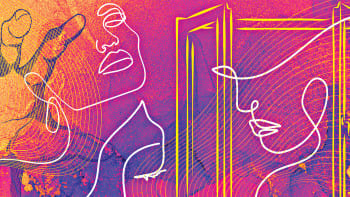Widening the domain of domestic abuse

A big gap in the common descriptions of domestic abuse is the mention of marital rape which is not even considered abusive in public perception. But for many women who endure domestic violence, marital rape is almost an inescapable issue further aggravated by the acute need to keep this particular form of violence, a secret.
Rokshana Begum, a domestic worker by profession, describes her ordeal: "It happened for years and years. Almost until he (her husband) died, a few years ago. He would come home drunk, pick a fight, hit me and then demean me even further by forcing himself on me."
Begum suffered decades of such abuse at the hands of her husband because he told her that she would suffer gravely if she denied her husband his "rights." "I had no clue that I too had rights," she adds.
"Victims of marital rape usually confide to a close confidante; going to law enforcement agencies or seeking legal redress is seldom a priority," says Sifat-E-Nur Khanam, associate legal specialist at BLAST.
This need for secrecy stems not only from cultural norms that discourage speaking out but also from an almost non-existent support system at home and insufficient awareness of the legal solutions available to them.
Bangladesh's legal framework provides very few avenues for addressing domestic violence and next to no protection for victims of marital rape.
The Domestic Violence (Prevention and Protection) Act, 2010, coming into place through the Citizen Initiative against Domestic Violence (CIDV) initiated in 2007, for example, emphasises resolving conflicts without disrupting family life. However, Khanam notes that the act's impact has been slow, due to poor implementation and a lack of awareness.
"An eighteen-point guide by the Honourable High Court mentions that a victim of rape may approach their nearest police station to file a complaint, and the authorities must consider it, noting all details, no matter which locality the victim belongs to or which area the incident has taken place," she mentions. "Unfortunately, implementation of such an important guide remains questionable."
Women who manage to approach a police station or law enforcement agency can also access mediation mechanisms such as an arbitration known as salish. Despite these provisions, the majority of victims remain unaware of their rights.
"In cases of rape, evidence becomes critical, but proving non-consensual acts is challenging, particularly for married women," opines Khanam.
The absence of marital rape as a legally recognised crime aggravates these issues. The concept itself is alien to Bangladesh's legal framework, with existing laws such as Section 375 of the Penal Code failing to accept that sexual violence can occur within a marriage unless the wife is under 12 years of age!
Many survivors of domestic violence also experience marital rape, yet they have no official alternative—except if the physical coercion results in harm or danger to life, limb, or health, and/or causes developmental impairment.
"Rape Law Reform Coalition, comprising BLAST and other likeminded advocacy groups, are working to address this gap by pushing for the inclusion of marital rape within legal definitions of sexual violence but addressing these systemic issues requires more than legal reforms," says Sifat-E-Nur Khanam.
Besides legal reform, Sifat emphasises altering social perception and awareness of this issue. She notes that societal attitudes must shift if we are to challenge archaic patriarchal norms that continue to suppress women and disregard their right to consent. It is also important that children are taught to respect women as equals. Both men and women must be seen as human beings first, whose consent takes top priority, whether in or out of marriage.
Munira Fidai is a mother, writer, and singer. She teaches language at Sunbeams English medium school.
Views expressed in this article are the author's own.
Follow The Daily Star Opinion on Facebook for the latest opinions, commentaries and analyses by experts and professionals. To contribute your article or letter to The Daily Star Opinion, see our guidelines for submission.

 For all latest news, follow The Daily Star's Google News channel.
For all latest news, follow The Daily Star's Google News channel. 










Comments